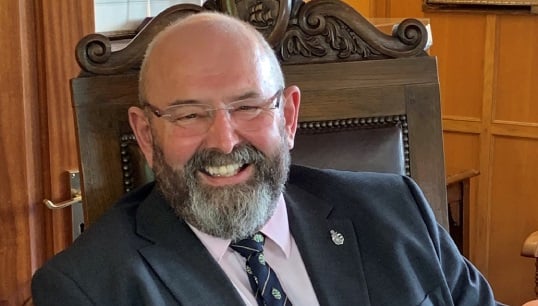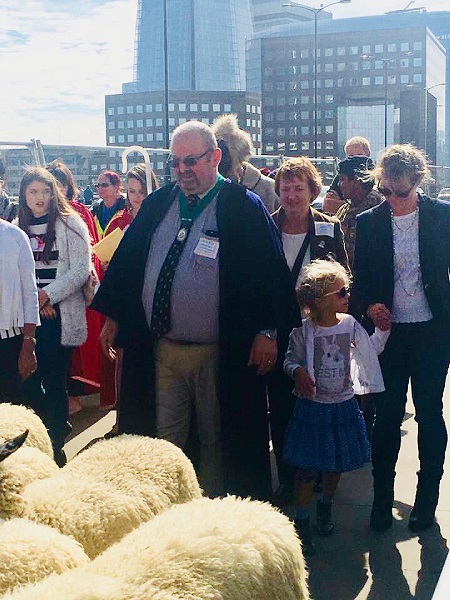- Topics
- Campaigning
- Careers
- Colleges
- Community
- Education and training
- Environment
- Equality
- Federation
- General secretary message
- Government
- Health and safety
- History
- Industrial
- International
- Law
- Members at work
- Nautilus news
- Nautilus partnerships
- Netherlands
- Open days
- Opinion
- Organising
- Podcasts from Nautilus
- Sponsored content
- Switzerland
- Technology
- Ukraine
- United Kingdom
- Welfare
Merchant Navy medal recipient Captain Jerry Mooney reflects on his career and service in training and mentoring deck officers
27 September 2024

Nautilus member Captain Jerry Mooney was honoured this year with the award of a Merchant Navy Medal for his long services to innovation, training and education in maritime. Having moved ashore in 2006 for a technical and compliance officer role, Capt Mooney reflects* on his career, and his time training and mentoring deck officers throughout their career.
What is your job?
I work ashore as a technical and compliance officer with the Bahamas Maritime Authority in London. I am currently working from home due to my terminal cancer diagnosis.
What originally attracted you to a career in maritime?
I really cannot remember, I think I must have had salt running through my veins. I started at the National Sea Training College at Gravesend in September 1979 as a Class V trainee and left the sea in 2006, having served as master on product tankers in northwest Europe for some 10 years.
Having left Gravesend in December 1979, I signed on the F T Everard vessel William J. Everard as a 'deck boy' and went through ordinary seaman to EDH, before getting my first Certificate of Competency in 1983 and getting promoted to second mate on Everard's fleet of coastal oil tankers. I left FTE and moved to BP Oil (UK) Ltd in 1989 for family reasons.
In 1996, I moved to Whitaker Tankers and got my first job as master. In 2006, I was offered the opportunity to move ashore into Whitaker's management team at their offices in Hull. In 2019 I left Whitaker’s having progressed to become the head of the company's operations team.
Do you have any personal or family connections to maritime?
Ever since I can remember I wanted to go to sea. We have family in Jersey and pretty much every school summer holiday we would spend time there, which meant getting to go out in my uncle's boat.
I now mentor deck officers through the Honourable Company of Master Mariners (HCMM) mentorship scheme and also provide a shoulder to lean on for two other deck officers. To be able to put something back into an industry that has treated me so well over the last 45 years I find immensely satisfying.
Tell us some of your career highlights so far
I have to say that I am immensely honoured to have been nominated for and awarded the Merchant Navy Medal for services to innovation, training and education in maritime. To be recognised by one's peers is humbling, and I can only hope that my input has been of some benefit.
Why do you think you received a Merchant Navy Medal?
Since coming ashore (initially) into ship management, my interest in the standard of training for UK seafarers, specifically deck officers, has grown. I joined the HCMM in 2012 in order to become a mentor to cadets, junior and senior deck officers wishing to become master mariners via the HCMM mentorship programme. I joined the HCMM's education and training committee and later became its chair. My involvement allowed me to interact more easily with organisations such as the Maritime and Coastguard Agency, the Merchant Navy Training Board and several training companies and organisations. Through these organisations, I became particularly involved with the use of simulators during training and the proposed remission of sea time; and also the welfare of seafarers - particularly cadets onboard vessels during the Covid-19 crisis when they were required to attend college remotely.
Before leaving my previous employer, I was also a director of the Safe Ships Training Group (SSTG). On starting work in London in August 2019, I able to increase my involvement via the HCMM, being based in the city. Up until my cancer diagnosis in July 2023, I was an HCMM court assistant as well as chair of the education and training committee, and I remain a mentor to three deck officers.
Unfortunately, my condition now prevents me from being as actively involved as much as I was, but the standards of training remain of great interest and concern to me.
What have been some of your biggest career challenges?
The biggest career challenge was probably having to work away from home, from my wife and my two children. I came ashore in 2006 when my son was 16 and my daughter 14. Even though I was working six weeks on / six weeks off by then, I still get 'what do you know, you were never here'!
Being married to a seafarer requires a particular type of person with a personality and inner strength. As evidence, my wife and I have now been together for 39 years. Here's hoping I get to reach the Ruby wedding anniversary; I love a party.
What is your favourite place you have visited during your career?
There have been many places, with different reasons for all. New Orleans and Georgetown, Guyana in the early 80s are particularly memorable, but just before I came ashore in 2006, I did six trips each of six weeks, delivering bunkers to vessels in the Bay of Gibraltar. Operating in a very busy stretch of water meant there was plenty of ship handling, which I really enjoyed. To put a ship alongside another, safely, at anchor without a 'bump' always gave me a great deal of satisfaction.
I also got to visit Gujarat, in India after I came ashore, and this prompted a holiday to India's Golden Triangle, taking in Delhi, The Taj Mahal, a tiger safari and Jaipur. A wonderful country and people.
Who has helped you the most in your career, and why?
At sea, I had worked on small coastal tankers (pretty much) since 1981 and there were two people who took the time and effort to show me the ropes, Captain Bill Willis and first mate Tony Preslee of F T Everard's vessel Asperity. I learned more about tanker practice from those two in a few trips than I did from any college or manual.
How long have you been a member of Nautilus, and what made you join?
I joined its predecessor union the Merchant Navy and Airline Officers Association in 1983 when I got my first ticket and was promoted to second mate. Membership offered certificate protection insurance, which seemed a very sensible idea.
What is the one change that would make the biggest positive difference to your job as a maritime professional?
My career as a maritime professional is coming to an end, so I can only hope for a future positive change for those who remain or wish to go to sea.
I believe that we are no longer training seafarers but academics, and that there is too much of a focus on gaining a degree at the expense of all else. Going to sea and becoming a deck or engineering officer is no longer a profession but a job. I see numerous images of cadets in a nice clean uniforms on the bridge of a cruise ship, but rarely see an image of a crew member engaged in tank cleaning, or being in charge of cargo operations on a bulk carrier.

The trip/contract lengths also concerns me. In my current role I regularly see contracts of 11 months, and even though the rest periods have been complied with, fatigue must be an issue. I believe that shorter trips with more leave should be the industry norm, ideally culminating in 1:1 for senior officers. Junior officers need an incentive to advance, as well as to learn.
The recent Covid-19 pandemic also highlighted the gap in knowledge between the maritime and non-maritime authorities. As an example, in my role as a technical and compliance officer we had to deal with a Coastal State Authority demanding Flag State Approved Repatriation Plans, yet not allowing crew changes in its own ports; and a case where a master was fined for arriving in a port with an expired passport as he'd been unable to renew it since all the consulates were closed. I can only hope that lessons have been learned from this and if it ever happens again, we won't see seafarers stuck onboard vessels and unable to get off and go home.
In my current role, I have conducted oral examinations on candidates looking to contain their II/1 OOW CoCs. The levels of basic knowledge for the 'Rule of the Road' and buoyage have been disappointing, to say the least. I was once told during an exam that radar was a good tool for avoiding rain showers so that passengers on the upper decks didn’t get wet!
Tell us one thing that people may not know about you.
As a Liveryman of the HCMM and a Freeman of the City of London, I exercised my right to drive sheep over London Bridge in 2016.
*Views expressed are those of Capt Mooney, and not necessarily those of the BMA
Tags
